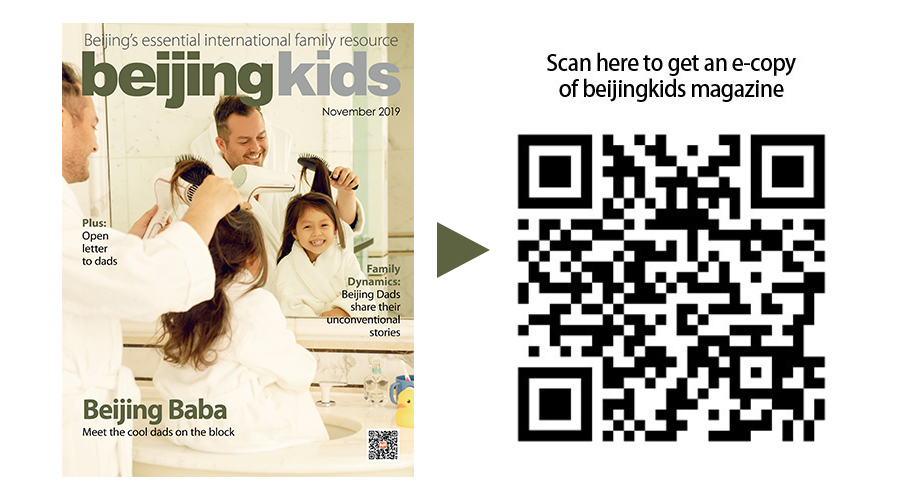Beijing’s international community is smart and cosmopolitan, and we often like to think of ourselves as being above prejudices and old-fashioned ideas about gender and ethnicity. But there’s one aspect in which we resemble a more traditional society: the realm of the “trailing spouse,” those of us who came to China because of our partner’s jobs or careers rather than our own. Almost without exception these are women accompanying their husbands, and the few men who do it are often given the derogatory label of “guy tai” (a play on taitai, the Chinese for wife). As one of those rare exceptions, I decided to find out just how rare I am.
Research turned up no reliable data on what percentage of trailing spouses might be male. One expat blog enthusiastically labeled it “a growing trend”, then produced a single lone example to interview. Another divided us, alarmingly, into “PIPs” and “POPs” (Previously Important People and Previously Ordinary People), but offered no data of any kind to justify its classifications. So I turned instead, as one does for everything in China, to WeChat.
Beijing Dads Group is one of the liveliest WeChat groups in the city, with nearly 400 dads sharing information, jokes, and thoughts on raising kids in the capital. However I was only able to find one other dad who would admit to being a trailing spouse. Based on this unscientific example, it looks like less than half of one percent of international dads came to China for their wife’s work.
“I knew it was for the best to move to Beijing, so I had absolutely no problems with it,” says Rob Hackett. “I’m pretty easy-going, while my wife can be quite intense, so we make a good pair in these kinds of decisions.”
It was not the first time he had moved for his wife’s career.
 “I met my wife in 2000, when we were both working at a startup in San Diego,” Hackett tells me. “She was a data scientist and I was a sales engineer. She had recently graduated with her PhD in Electrical Engineering, and I was studying for the GMAT to go to business school. My wife stuck with the company after its acquisition and was offered a promotion at another company in Orange County, CA. I had just finished business school, so it was a good time to move. I landed a job in the in-flight entertainment industry and have been pretty involved with that through to 2018. My wife left her company in 2014 and started her own business going back and forth to China. Eventually she received funding in 2015 and asked us all to move to Beijing.”
“I met my wife in 2000, when we were both working at a startup in San Diego,” Hackett tells me. “She was a data scientist and I was a sales engineer. She had recently graduated with her PhD in Electrical Engineering, and I was studying for the GMAT to go to business school. My wife stuck with the company after its acquisition and was offered a promotion at another company in Orange County, CA. I had just finished business school, so it was a good time to move. I landed a job in the in-flight entertainment industry and have been pretty involved with that through to 2018. My wife left her company in 2014 and started her own business going back and forth to China. Eventually she received funding in 2015 and asked us all to move to Beijing.”
Modern technology means that moving with your partner doesn’t have to mean the end of your own career.
“I left my position in 2016,” Hackett says, “but was able to secure another with an American company to work remotely at home from 2016 to 2018. They needed me to return to California every summer, so it was a win for everyone. My wife travels five days a week, so I was the primary caretaker from the beginning. My contract expired near the end of 2018, so I have been a full-time stay-at-home dad ever since.”
For me, on the other hand, the move meant giving up a business I had spent three years building from scratch. When I met my wife, she was working in skills development while I managed projects supporting homeless and vulnerable families. We both then made mid-life career changes: my wife retrained as a teacher, while the publication of my first novel allowed me to follow my lifelong dream of making a living as a writer.
I earned my money teaching creative writing in a variety of settings, mentoring aspiring writers and taking on roles such as “writer-in-residence” at an art gallery. It was fulfilling work, and I had finally built enough income streams to make a viable living from it. So why leave it all behind?
The reason was that I was working so hard at being a writer that I had no time for actually writing anything creative myself. So when my wife suggested she look for work in another country, so that our kids could have the experience of living in a different culture for a couple of years, I jumped at the chance.
“It’s like you’ve got a two-year writing retreat,” a novelist friend said enviously.
However, being a “guy tai” was not the easy life I had imagined. Having always worked, I found myself after a few months bored, broke, and seriously considering returning home to England. I was saved by a colleague of my wife’s who was on the Parent Board of beijingkids.
“Isn’t your husband a writer?” she said. “They’re always looking for freelancers.”
Four years later, we are still here, and I am still working for beijingkids.
Hackett too recognizes the important role work plays in maintaining our self-esteem and sanity.
“I really miss the social support structure that full-time work provides,” he tells me. “I belong to a few WeChat groups that really help out in this regard and have a couple of close friends in Beijing that I see regularly. I recently had surgery on my leg and was really nervous about having an operation done in China. The people I know in my WeChat groups really helped to alleviate my anxiety and made everything a whole lot better.”
I ask him how people react when he tells them he’s a stay-at-home dad.
“The responses I get from people vary quite a bit.,” he says. “My boys went to a Chinese bilingual school for the first two years, and I think I was the first dad that ever helped on field trips or in the classrooms. My school friends became the Chinese moms, and they venerated me as some kind of saint. They thought it was great that a dad took an active role, with one of them going so far as to shaming her husband in front of me. I had to come to the poor guy’s defense.”
Not everyone responds as positively though.
 “The older (55 plus) Chinese men at the gym love giving me a hard time about it. ‘How’s the boss?’ and ‘Did you join my wife’s flower club yet?’ were some of my favorites. The younger Chinese (under 30) are similar to Americans and Europeans, who are completely indifferent about it. Even the ones who are super curious about American culture just assume it’s ‘what’s best for the family’. I think it really exemplifies the growth and global understanding that the next generation of Chinese have about the world.”
“The older (55 plus) Chinese men at the gym love giving me a hard time about it. ‘How’s the boss?’ and ‘Did you join my wife’s flower club yet?’ were some of my favorites. The younger Chinese (under 30) are similar to Americans and Europeans, who are completely indifferent about it. Even the ones who are super curious about American culture just assume it’s ‘what’s best for the family’. I think it really exemplifies the growth and global understanding that the next generation of Chinese have about the world.”
But his choice is supported by the most important stakeholders of all.
“I asked my boys if they would rather have daddy or mommy at home and they both said ‘daddy’, but I’m pretty sure it’s simply because I have grown to be more patient with them (which wasn’t always the case). I remember asking them when they were younger and my mother-in-law spent a lot of time with them, and their answer was ‘Grandma’.”
I put the question to my kids, to be greeted with bewildered shrugs. They see nothing odd or exceptional about the situation at all.
“When you talk about it with your friends at school, what do they say?” I persisted.
“Dad, do you seriously think we sit around with our friends talking about you and mom and your jobs?” my 13-year-old responded, not unreasonably.
“Well, would you rather have Mom at home than me?” I asked, and this time received a definite “no!”
“At least we get to eat good food with you,” my 10-year-old said.
“Are you saying,” my wife asked with dangerous sweetness, “that I don’t make good food?”
“No, you make great food Mom!” he said, then added quietly, “as long as you like salad.”
Although there is little research into the needs of male trailing spouses, I found a 2010 doctoral thesis by Anne M. Braseby of Florida International University entitled, Adaptation of Trailing Spouses: Does Gender Matter?
“Adjustment is harder for male trailing spouses,” writes Dr. Braseby, “because psychologically they still feel the need to earn money and be a token breadwinner which inhibits them taking on new identities, but easier because they do not need such a strong support system, and they do not feel the guilt of leaving the responsibilities to their families back home.”
Men were less likely to get involved in voluntary work, she found. While women saw it as giving them identity and purpose, men tended to perceive it as “doing menial work for free”. Perhaps most importantly however, she found that men had always made the decision to become a trailing spouse by active choice, whereas women often felt pressured into it by social expectation. So men were better able to create the “new identity” required to survive and thrive as an expat, because they embraced it enthusiastically.
This insight gave me a new perspective on the “expat widow” of myth, often mocked and envied for their leisured lifestyle. I certainly found that idleness leads to frustration and unhappiness; how much worse this would be if you had given up your support networks reluctantly, out of a sense of obligation.
 The traditional expat though is usually here for only a few years before returning to their home country; a pattern which is less and less common, as ever fewer foreigners come to Beijing on postings from big corporations. I asked Hackett what the future held for his family.
The traditional expat though is usually here for only a few years before returning to their home country; a pattern which is less and less common, as ever fewer foreigners come to Beijing on postings from big corporations. I asked Hackett what the future held for his family.
“We have had a few discussions about the future,” he said. “I definitely want to go back to work, as I am slowly exhausting the accomplishments of my hobbies and desires. The debate will be, do I work in China or do I work in the US? Mommy has a very important role with the kids, but at the same time her parents would like to see them more often, and the kids want to visit their friends in America. No matter where I work, someone is going to have to make some sacrifices.”
For my family, we have decided that this will be our last year in China. Having come for two years and stayed for five, we will be ready for a change by next summer. However we are not keen to return to Brexit Britain, a country racked by anxiety and division. Instead we’re going to look for a new adventure somewhere else in the world. I worry of course about what I’ll do when we get there; sitting around getting bored is not an option, and I may not be lucky enough to find an employer as good as beijingkids has been. Whatever the future holds though, I will be entering into it as a matter of choice not compulsion, ready to adapt and make the best of it… Not trailing, but striding.
 This article appeared in the beijingkids November 2019 Beijing Baba issue
This article appeared in the beijingkids November 2019 Beijing Baba issue




